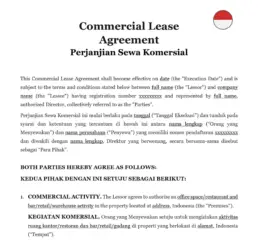Getting Started with Office Space Rentals
Securing the perfect office space is a crucial step towards achieving business success. The process, however, involves more than just finding a location that suits your needs. It’s essential to navigate the complexities of rental agreements, understand local regulations, and protect your investments. This guide will provide you with essential tips for negotiating office space rentals, ensuring you make informed decisions and secure the best possible terms. Additionally, we’ll touch upon common pitfalls in rental contracts, the importance of ground leases for safeguarding your investments, and the necessity of accurate documentation of rental payments in Indonesia. These insights will not only help you in negotiating your office space rental but also in comprehensively managing your business’s legal and financial responsibilities.
Preparing for Your Office Space Search
Part 1: Understanding Your Needs
Before diving into the market, it’s crucial to clearly define your office space requirements. Start by assessing the size, layout, and specific amenities your business needs to operate efficiently.
1. Identify Space Requirements: Determine the amount of space required per employee and consider any additional areas needed for meetings, storage, or specialized equipment. Tools like space calculators can be helpful in this process.
2. Future Growth: Plan for potential growth. Consider an office space that can accommodate your business expansion without requiring an immediate move. It’s essential to have flexibility in your lease terms to scale up as needed.
ℹ️ By carefully analyzing your current and future space requirements, you lay the foundation for a successful office space search.
Part 2: Researching the Market
Once you have a clear understanding of your needs, the next step is to research the market to find the best location and rates for your office space.
1. Location Analysis: Evaluate potential locations based on proximity to clients, accessibility for employees, and local amenities. A convenient and desirable location can boost employee satisfaction and client impressions.
2. Market Rates: Understanding current market rates is crucial to ensure you are getting a fair deal. Research average rental prices in your desired area and compare them to what is being offered. Consider factors such as building age, facilities, and additional services when comparing prices.
Part 3. Financial Considerations
Financial planning is a critical aspect of securing office space. It’s important to set a realistic budget and be aware of potential hidden costs that could affect your overall expenses.
1. Budgeting: Establish a clear budget for your office space rental, including monthly rent, utilities, maintenance, and any additional costs. It’s important to stick to this budget to avoid financial strain on your business.
2. Hidden Costs: Be wary of hidden costs that can quickly add up. These may include maintenance fees, utility charges, parking fees, and costs for shared facilities. Make sure to ask for a detailed breakdown of all expenses to avoid surprises later.
ℹ️ By thoroughly preparing and conducting detailed research, you lay a solid foundation for a successful office space search. For assistance with financial planning and to avoid potential pitfalls, consider using our Commercial lease agreement
Key Lease Terms to Negotiate
Understanding and negotiating lease terms and conditions are crucial steps in securing an office space that meets your needs while protecting your business interests. Here are key factors to consider:
| ➤ Length of Lease: Lease terms can vary widely, from short-term agreements of one year or less to long-term commitments spanning several years. Assess your business stability and growth projections to choose an appropriate lease duration. |
| ➤ Flexibility and Renewal Options: Negotiate terms that allow for flexibility, including options to renew the lease, expand into additional space, or terminate the lease early if necessary. Ensure these options are clearly outlined in the lease agreement. |
| ➤ Rent Escalation Clauses: Understand how and when rent increases will occur, and negotiate caps or limits on the amount or frequency of rent hikes to avoid unexpected financial strain. |
| ➤ Maintenance and Repair Responsibilities: Clearly define who is responsible for maintenance and repairs. Ensure these responsibilities are explicitly detailed in the lease to prevent unexpected expenses. |
| ➤ Subleasing and Assignment: Negotiate terms that allow you to sublease or assign the lease to another tenant if your business needs change. This provides flexibility and can prevent financial losses. |
| ➤ Exit Clauses: Include clear exit clauses in case you need to terminate the lease early. Negotiate terms that are fair and minimize penalties for early termination to provide peace of mind and financial security. |
Additional Considerations
Ground leases offer long-term control over land while allowing flexibility in its use. These leases can safeguard your investment by providing a stable and predictable framework for property use and development. They are particularly beneficial for commercial developments involving substantial infrastructure investments.
Understanding and avoiding common mistakes in rental contracts is crucial. Common issues include ambiguous terms, insufficient maintenance clauses, and unclear renewal conditions. By ensuring clarity and specificity in your rental agreements, you can prevent costly legal disputes and operational headaches.
3. Accurate Documentation of Rental Payments
Maintaining precise records of all rental payments is crucial for both landlords and tenants. This includes receipts, payment schedules, and any communication related to payments. Accurate documentation helps in resolving disputes and provides a clear financial history, which is essential for transparency and accountability.
ℹ️ Explore all our comprehensive guides on our website to ensure full compliance and a successful start for your business in Indonesia.
Ask your question and receive legal advice from a qualified lawyer
310 client reviews (4.8/5) ⭐⭐⭐⭐⭐











